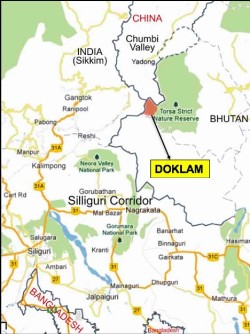Tibetet Segítő Társaság Sambhala Tibet Központ
Tibet Support Association Sambhala Tibet Center
székhely / telephely H-Budapest I. Attila út 123..
(00-36) 70 431 9343 (00-36)70 944 0260 (06-1)782 7721
sambhala@tibet.hu www.tibet.hu tibetpress.info
Facebook/Sambhala Tibet Központ Facebook/Tibett Segítő Társaság
MagnetBank/ 16200010-00110240
IBAN/HU94 16200010 00110240 00000000 SWIFT/HBWEHUHB
(1%) adószám/ 18061347-1-41
nyitva tartás/hétköznap 12.00-20.00 hétvégén előadás függő
» tibeti művészet» lapszemle.hu» thetibetpost.com» eastinfo.hu» rangzen.net» ChoegyalTenzin» tibet.net» phayul.com» DalaiLama.com» vilaghelyzete.blogspot.com» Videók» Linkek» TibetiHírek» Szerkesztőség
India must get accustomed to more roads in Doklam, Tibet border: Chinese expert/ENG
2017. szeptember 4./Phayul.com/TibetPress
eredeti cikk
By Tenzin Monlam
 DHARAMSHALA, September 4: A Chinese strategic expert has warned India to ‘get accustomed’ to more Chinese constructions and roads ‘not only in Doklam’ but allover the border areas in Tibet and Xinjing.
DHARAMSHALA, September 4: A Chinese strategic expert has warned India to ‘get accustomed’ to more Chinese constructions and roads ‘not only in Doklam’ but allover the border areas in Tibet and Xinjing.
Victor Gao Zhikai, Director of China National Association of International Studies, told India Today, “India will need to get accustomed to the fact that China is the largest, most effective and powerful road builders. In Doklam if China is building on the Indian side of the border, India will have the legitimate reason to disagree.”
He further added, “However, if China is building connectivity projects and roads on the Chinese side of the border, then no other country has the right to intervene. The roads themselves are actually neutral and India should be accustomed to more beefed up Chinese infrastructure not only in Doklam but in other parts of Tibet.”
The end to the standoff that lasted over 70 days had come just ahead of the BRICS Summit in Xiamen, China, which the Indian Prime Minister Narendra Modi attended. Ahead of his bilateral meeting with Chinese President Xi Jinping, India laid out hints that they want to move forward and leave the issue behind.
Gao said that China does not want war, which is one of the main reasons for the de-escalation of troops from the region, on both sides.
“The situation could have flared up into a border war. Once there is a border war, neither China nor India can control the magnitude or course of development. A small border war may eventually have the possibility of degenerating into a huge war and both India and China will suffer huge consequences for that,” said Gao, who had also served as the interpreter to former Chinese President Deng Xiaoping.
The Chinese expert also lauded the Indian PM for attending the Summit hosted by China this year. He said, “It is a great development that PM Modi decided to attend the summit and this bodes well for solidarity among BRICS countries even when some of them have been plagued with difficulties.”
